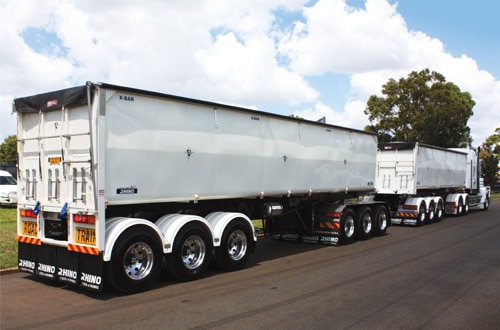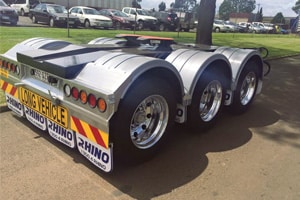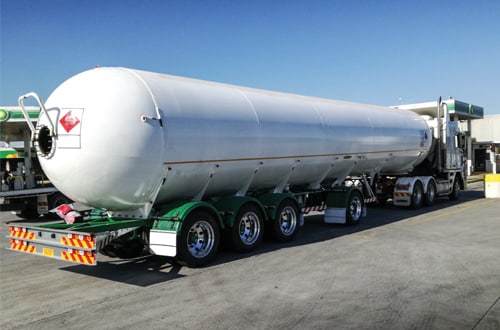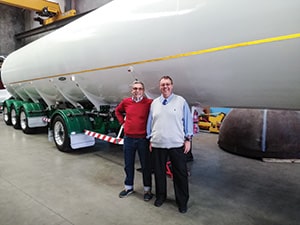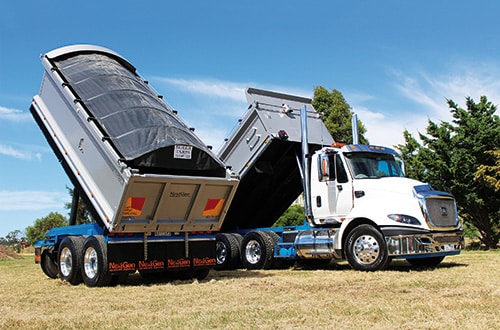
Streamlining trailer production lead times and preparing for the future, Next Gen Engineering uses Fuwa K-Hitch axle and suspension systems as a standard across its business.
Optimising its trailer builds with Fuwa K-Hitch suspension and axle systems, trailer building business, Next Gen Engineering, has grown exponentially since its inception three years ago.
Operating from its new facility in Campbellfield, Melbourne, Next Gen Engineering Director and owner, John Abela, says that by the end of 2017, his company will have manufactured over 130 trailers in the year. “The new facility now has its own ‘spray and bake’ set-up as well as workshops with bending machines – all the machinery needed to do what we do best. This year, we continue to set new benchmarks for trailer productivity.”
John explains that he has worked hard to perfect his in-house operations to achieve efficiency gains, positioning the OEM for further growth while providing clients with prompt service and quality equipment. “Getting faster at building transport equipment means looking at the big picture while also considering every detail, no matter how small,” he says. “The team realised, within three months of opening shop in 2014 that it was possible to boost trailer manufacturing times by simply choosing axle and suspension gear that was much easier to work with.”
Fuwa K-Hitch Regional Sales Manager, Diaa Bishara, says that Fuwa has been supplying the trailer builder with KT250 air suspension systems with 10-stud disc brake axles that are fitted with WABCO Pan 19 brakes for about three years.
“The KT250 is a U Bolt version suspension that allows flexibility for John when fitting our full range of axle sizes such as 19.5” and 22.5” drum brake and disc brake models,” Diaa says. “Fuwa K-Hitch welds and assembles the suspensions to the axles at nominated chassis rail centres here in Derrimut as well as pre-installing additions such as Anti-Lock Braking System (ABS) pole wheels, sensors and automatic slack adjusters.”
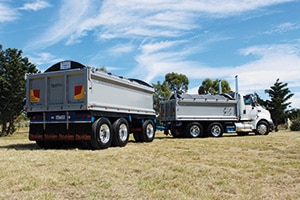
Diaa explains that Fuwa K-Hitch also supplies John with KI250 integrated air suspension that is suited for 22.5” wheels as well as a full range of products to suit John’s dog trailer applications including ball race assemblies, towing eyes and drawbar hardware which he says makes life as easy as possible from a supply perspective.”
“Fuwa K-Hitch gear seems to fit in almost seamlessly with our production builds,” John says. “The performance advantage is something like three-to-four days per trailer, which is phenomenal considering it now takes the company about seven working days to finish a new tipper or dog trailer, as opposed to 10-12 days.
“This boost to productivity is a boon to not only the end-user but also to the industry. The latest custom design to be delivered is a three-axle trailer tipping dog, which would have seen a longer production cycle if it wasn’t for the Fuwa K-Hitch axle and suspension fitting.”
John also explains that having access to a reliable supplier like Fuwa K-Hitch is essential for efficient forward planning. “Fuwa K-Hitch is a great supplier and has always maintained excellent communication, providing as much as three-weeks notice to advise ETAs for new axle and suspension deliveries.”
With Fuwa K-Hitch providing effective after-sales support, Next Gen Engineering can coordinate better trailer builds. John says that if a trailer build was to enter the axle and suspension stage without having access to the specified parts, it can waste an entire day – protracting the manufacturing lead-time, which makes Next Gen Engineering’s professional relationship with the manufacturer important for maintaining exceptional customer service.
Embracing the benefits of trailer building productivity – to benefit commercial transport operators looking for reliable tippers and transport equipment – Next Gen Engineering is working hard to push its capabilities even further.
“Next year, Next Gen Engineering will be out to play with the ‘big boys’,” John says. “I intend to ‘grab the bull by the horns’ to create a legacy as a reliable and efficient trailer builder, using quality axle and suspension gear to complement our goals of achieving greater operational efficiencies and shorter production cycles.”
Fast Fact: Since 2014, John Abela, Director and owner of Melbourne-based business, Next Gen Engineering, has narrowed the company’s focus on manufacturing general bodies and tipper equipment. “I decided to specialise because there are a lot of fleets out there looking for tippers at the moment, so much so that we’re actually trying to keep up with the demand for our gear. It’s a good problem to have,” he says – adding that the high demand doesn’t affect his delivery promise.


